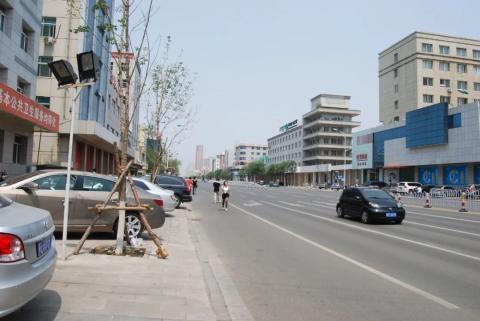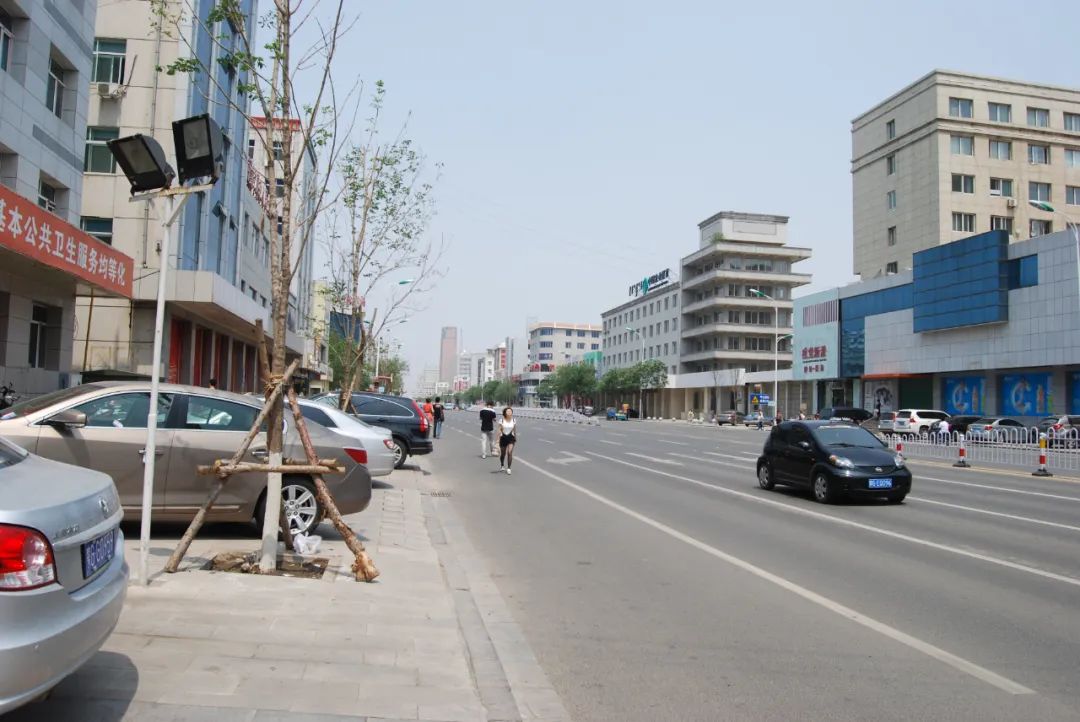
Time: June 6~8, 2013
Location: Zhalantun City, Tongliao City, Inner Mongolia
Chapter 19 of Jingxiang’s Travels | "Travel to the Northeast" Chapter 19
In terms of geography, he can be called superior, and in terms of human relations, he deserves to be an expert.
I walked a lot of scenic spots during the day and was exposed to the sun for another day. I felt like I had a serious cold at night and I was worried about whether I could survive tomorrow. Sure enough, I woke up after dawn and felt light-headed, so I told Teacher Bai: "I'm not going to Mo Qi today, I'm going to the hospital."
After wiping my nose in the hotel all day and still not getting better after lunch, I thought of going home. The original plan was to go to Chenbalhu Banner on Saturday, 6, 8. It is a grassland. You may walk or ride a horse. If you don't get sick, you can withstand the scorching sun.
According to the scheduled plan, I was afraid that I would not be able to buy a ticket by then, so I had already bought a train ticket in advance from Hailar to Tongliao on June month in 2013. It's 6 month 6 day . Tickets are easy to get, just go to Hailar to refund them. My plan was to take a flight from Hailar directly back to Guangzhou, but now I am in a hurry.
I checked online and found that there were no direct flights to Guangzhou. It seemed that I had to go to Tongliao and then transfer to another plane. However, if we leave from Tongliao, why bother to return to Hailar? Because the train from Hailar to Tongliao passes through Zhalantun. This means that the ticket from Hailar to Tongliao will be invalid. First, the ticket from Yakeshi to Zhalantun is invalid, and now another ticket is invalid. This is tuition fee paid by inexperienced people!
When I arrive at Tongliao two days in advance, I must say hello to Principal Wang of Tongliao. After making the decision, I bought a train ticket for 6 month 7 in the evening 1133 minutes. Two days, two whole days spent wiping noses and taking medicine. Not only did one of the three autonomous flags fall, the Molidawa Daur Autonomous Banner, but also the place I wanted to go to the most - Chenbalhu Banner, I didn't make it. Living in a yurt, riding a horse, and seeing Aobao all came to nothing. Perhaps, it is difficult to be perfect in the world, and it is inevitable to leave some regrets.
I slept soundly on the train for more than 6 hours. After waking up, I went to the dining car for breakfast. I ate two bowls of porridge and left the steamed buns and side dishes basically untouched.
June 6, 2013 at 9:00 AM We entered Tongliao Railway Station and were greeted by Principal Wang, a youth education expert who had been featured in a special program produced by a provincial TV station.
"Welcome Principal Lin to pass on the teachings and give treasures." Her first words turned me, a tourist, into a professor who came here to give lectures. I quickly responded: "I'm here to learn from you, an expert."
"I have read your "Family Education Case Enlightenment". The viewpoint is very unique and I have seen the essence of the problem." She said it very naturally, and you would not think that she was deliberately flattering.
"Your book "Being a Caring Story Mom" is very practical. It seems that reading it once is not enough." My words sounded a bit flattering, but I really admired this psychological counselor from the bottom of my heart. of high emotional intelligence.
Two distant friends, who both graduated in accounting, are engaged in family education, and both have published family education books, were talking about common topics.
In Tongliao on June 8, the temperature was as high as 30 degrees, and the temperature difference on this day was small. On this hot street, if this were Guangdong, you would see women walking generally wearing parasols or hats, and women riding motorcycles mostly wearing sun-shading cloaks. But it's different here. No one walking on the street is holding a parasol.

I saw a lot of "Horqin" terms in Tongliao City, and then I realized that I had moved from Hulunbuir Grassland to Horqin Grassland.
There are four major grasslands in Inner Mongolia: Hulunbuir Grassland, Horqin Grassland, Xilin Gol Grassland and Keshiketeng Grassland. Among them, the Hulunbuir Grassland that I have already walked is located in the northeast of Inner Mongolia, the Xilin Gol Grassland is located in the central part of Inner Mongolia, and the Keshiketeng Grassland is located in the southeast of Inner Mongolia. The Horqin Grassland that I am visiting now is located in the eastern part of Inner Mongolia. Tongliao is the Horqin Grassland. Political, economic, cultural and transportation center, The urban area of Tongliao is called Horqin District.
It is difficult for us Han people to remember the names of ethnic minority places because these names are actually the Chinese transliterations of a certain ethnic minority language. We often feel that these transliterations are mysterious. But if we restore their original meanings, you will find that the origins of their place names are simple and straightforward. It means "bow maker" or "good archer". The Yarlung River is a clear river. "Yakeshi" means "fortress" in Manchu. Hailar means "wild leek" in Mongolian, because people originally saw wild leeks growing here.
If these names are translated as Chinese place names, the Han people will be confused: there are dozens if not hundreds of "clear rivers", and there are even more "fortresses". If you say you want to go to a "fortress", others will Do you think you are going to Yakeshi?
The place names of the Han people focus on specific directions: Shandong – east of Taihang Mountain; Shanxi – west of Taihang Mountain; Hunan – south of Dongting Lake; Hubei – north of Dongting Lake. If we change back to the nomenclature of ethnic minorities, it should be like this: Shandong - next to the mountains; Shanxi - next to the mountains; Hunan - by the lake; Hubei - by the lake. Can you find north?
I think the reason why ethnic minorities have straightforward names is related to the small area where they originally lived. In a big mountain where an entire nation lives, there may be only one river, no matter what you call it, there will be no confusion; there is only one place that can be called a fortress, and no one can go wrong. The Han nationality has a vast territory and most of them live in the plains. As soon as you leave the door, you will see several rivers, so of course they must be strictly distinguished.
However, Tongliao's geographical location really lives up to its name. It is located at the intersection of the two major economic zones of North China and Northeast China, straddling the throats of North China and Northeast China, and the hub connecting Beijing, Tianjin, Hebei, Heilongjiang, Jilin, and Liaoning. It is known as the "thorough of seven provinces". Today's Tongliao is no longer just as simple as the name it got from "Connecting to Liaohe River". If you don’t believe it, you can ask the logistics company. When it comes to mail sent to Inner Mongolia, the logistics company first frowns: “Where is Inner Mongolia?” When you say Tongliao, they immediately smile: "There is no problem in Tongliao! " This shows that Tongliao's transportation is developed.
Principal Wang specially invited several Chinese studies teachers to have lunch together. This was to find a common topic for me! I admire her reception arrangements very much in this kind of non-official and non-publicly funded favors. During her three days in Tongliao, her entire arrangement was simply a model for reception.
Today's exam-oriented education makes schools and parents focus on scores and ignores the cultivation of emotional intelligence. What truly succeeds is not your scores, but your emotional intelligence. Principal Wang is very sophisticated in dealing with people, and people are willing to associate with her.
Family education is inherently a social science, and everyone has their own views. For example, the problem of "youth rebellious period": If we say that teenagers will inevitably become rebellious when they mature physiologically and accumulate knowledge to have their own thoughts, then I believe most people will nod in agreement. But what if I say that it is the result of improper early family education and is not necessarily related to physiological maturity? I believe many people will disagree. However, regardless of whether Principal Wang agrees with my point of view, she will not refute it, because she knows that maybe I am right, even though scientists and educators all agree that it is related to physiology. If my point of view is wrong, it will not prevent her from thinking more.
Of course, I will tell you my basis: before the one-child policy was introduced, there was no inevitable connection between adolescence and rebellion. In ancient times, girls got married at the age of fifteen or sixteen, and boys already became fathers at the age of twenty. What is their adolescence like? It’s responsibility, it’s responsibility: When I grow up, I should take on the responsibilities of my family. Is this rebellion?
Why do our experts equate adolescence with rebellion? Because this is the result of their survey of this generation of only children. The reason why this conclusion of treating appearance as essence is widely recognized is because most people see its verifiability in reality – we see this is indeed the case with the children around us.
If our parents cultivate their children's emotional intelligence from the beginning, allowing them to take into account the feelings of their family, have an overall view of the family, and assume social responsibilities from an early age, will they still be rebellious when they reach adolescence?
However, seeing the essence of a problem is the perspective of decision-makers, while solving superficial problems is the way ordinary people deal with things. If you want to gain a foothold in society, you must adapt to the social environment and follow the trend. In China, which has thousands of years of feudal culture, handling interpersonal relationships well is the cornerstone of success. In order for children to be able to handle interpersonal relationships well in the future, cultivating children's emotional intelligence from an early age is the cornerstone of success.
Your children are very lucky if their teachers give them examples of high emotional intelligence. I believe that President Wang’s students are all lucky. If they can learn from her way of life, it may be more valuable than being admitted to Tsinghua and Peking University.
If you want to know what happened next, please read Chapter 20: Drinking Horse Wine, Appreciating Prints, and Dinner with the Masters of the Imperial Family
